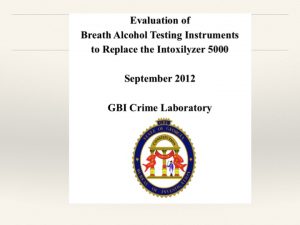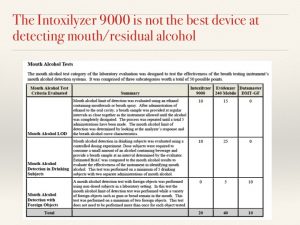If you have been charged with DUI in Georgia and you submitted to the requested state-administered breath test, you probably were tested on an Intoxilyzer 9000. For some reason, many people mistakenly believed that the “new” Intoxilyzer 9000 was an improvement over the Intoxilyzer 5000. The evaluation that the Georgia Bureau of Investigation (“GBI”) performed upon the Intoxilyzer 9000 and two (2) other machines prior to implementation of the Intoxilyzer 9000 as the breath testing machine draws into question this assumption. If your DUI lawyer is knowledgeable about this report, there is some fantastic data that can be used to illustrate doubts as to the reliability of the breath test device used in the prosecution of your Georgia DUI case.

Nearly everyone that is knowledgeable breath testing acknowledges that one of (if not “the) greatest challenges in breath testing is controlling for mouth or “residual” alcohol. It is a huge problem in breath testing, and as it turns out, the Intoxilyzer 9000 is really bad at detecting the presence of residual alcohol:

Out of 50 possible points, the Intoxilyzer 9000 scored 20 – 40% of the possible points. That is how bad the breath test device used in the prosecution of Georgia DUI cases is at detecting mouth alcohol. This table is a summary of how the Intoxilyzer 9000 performed on three (3) separate mouth alcohol tests. In subsequent posts, we will discuss how the data that supports the Intoxilyzer 9000’s poor score.
————————-
This post is provided by Georgia DUI lawyer Ben Sessions of The Sessions Law Firm, LLC. Ben is 1 of 4 Board Certified DUI Defense Attorneys in Georgia.